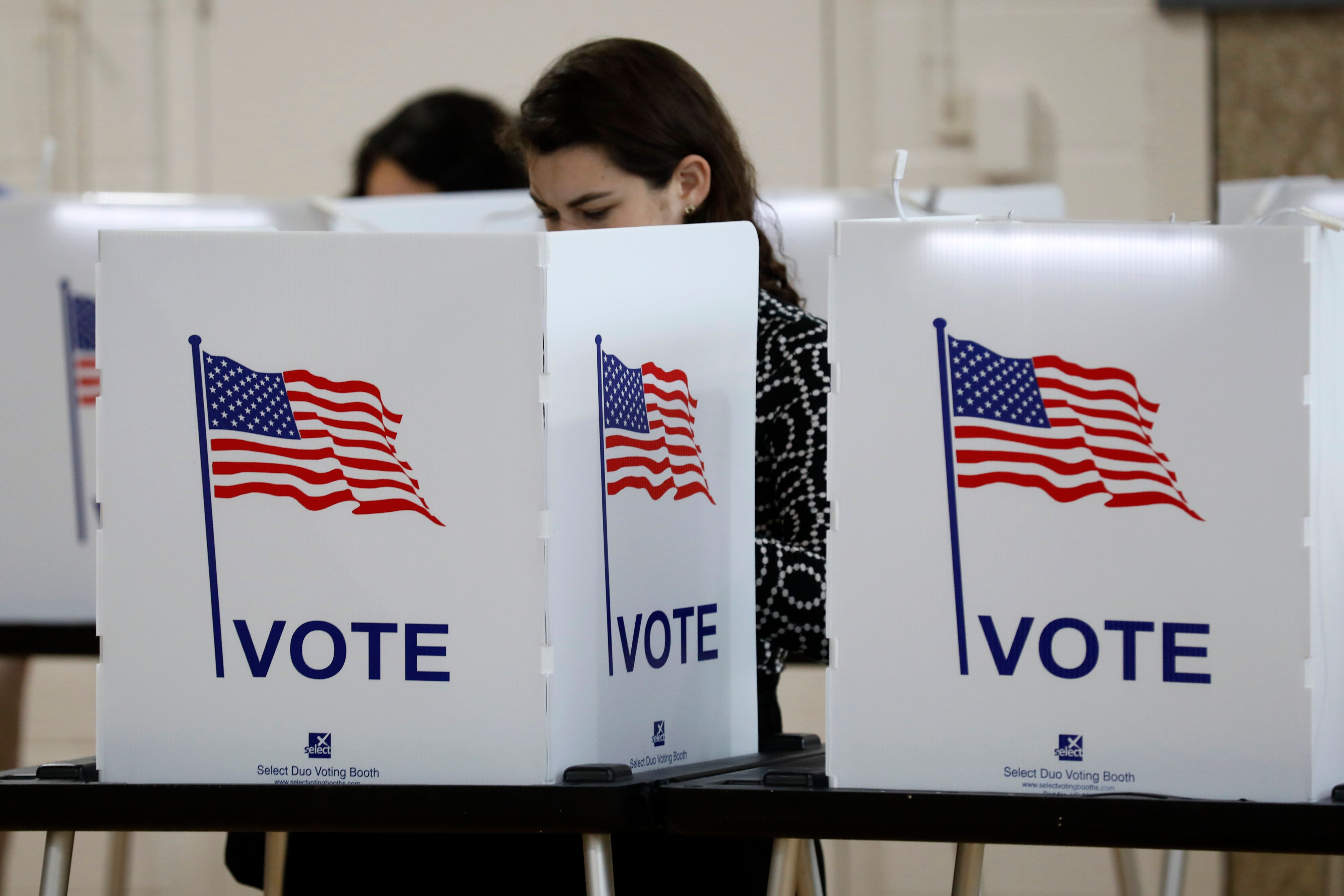People vote in the Michigan primary election at Chrysler Elementary School in Detroit, Michigan, on March 10, 2020.
Jeff Kowalsky | AFP | Getty Images
Some investors are placing bets that the stock market could have a massive sell-off following the election, and some analysts say it’s because of the fear of a Democrats winning the presidency and both houses of Congress.
The price of puts, or options that predict a negative outcome, for the S&P 500 have been rising in price for November into December. Analysts say it’s early in the year for those types of trades around the Nov. 3 election.
“Obviously, it’s early. However what the options market was beginning to indicate … was the potential for a clean sweep in November,” said Quincy Krosby, chief market strategist at Prudential Financial.
Krosby said President Donald Trump is still viewed as a better steward of the economy, and therefore better for the market than former Vice President Joe Biden, who has said he would raise taxes on corporations. The RealClear Politics average of polls shows Biden ahead by 5.9 points.
“The more the market prices in a Biden victory, what seems to also happen is the more they’re pricing in a clean sweep. The explanation is if voters go toward Biden, they may also want to clean house,” Krosby said.
Analysts at BCA Research said the stock market is underestimating how negative a Biden victory would be for investing. “If the Democrats gain control of the Senate alongside a Biden victory, as our Geopolitical Strategy Service projects, financial markets may have to begin discounting a future materially less friendly regulatory and tax policy,” the analysts note.
The Democrats would be negative for corporate profits and put pressure on margins with an expected tax hike, the BCA analysts said.
Julian Emanuel, head of equity and derivatives strategy at BTIG, said he thinks investors are scared about the election in general, and that any outcome is going to be disappointing.
One measure he watches in the options market is flashing a warning of high volatility for the S&P 500, more than at any time since the financial crisis. It’s called the skew, or the difference in spread between the most expensive put option and the cheapest call option, and Emanuel said it’s the highest it’s been since the financial crisis. A call option represents expectations for a move higher in the S&P 500.
“They’re basically saying the downside risk is perceived to be historically high versus the upside reward. That’s basically what the options market is saying,” said Emanuel. “People are afraid of a Democratic sweep. They’re afraid of a Republican sweep, and there is literally no election outcome that isn’t seen as creating more risk.”
Emanuel said the market had been fearing the move toward a progressive agenda, but Biden is seen as the most moderate Democrat.
“There is a concern literally regarding any political outcome here. Given the fact that both sides see value in keeping tensions high with regard to China, I don’t expect the hedging to diminish at all over the election,” he said. Emanuel said technology stocks have been under pressure due to concerns about tensions between the U.S. and China, and that could continue.
Source: BTIG
“China’s unpopularity with U.S. voters has reached anew high in the wake of the pandemic, and candidates are likely to compete with one another to appear tougher on China,” the BCA analysts wrote.
Dan Deming, managing director KKM Financial, said the prices for futures were bid higher in later months. “The futures are being bid up so therefore that implies that there’s demand for those SPX options in November,” he said. “All the futures are being bid up so you’re seeing more demand across the board for what mostly likely would be out-of-the money puts.”
He said there’s some interesting trades for December, and some of those puts are getting expensive. For The December S&P 500 contract with a strike of 2,000 has open interest, or contracts outstanding, of 58,000.That means investors see risk that the S&P 500 could fall to 2,000. For the strike at 1,900, the open interest is 34,000. The S&P closed at 3,055 Monday afternoon.
“There’s no question you’re seeing the way the way out-of-the-money puts being bid up,” said Deming. “There’s hedging going on for the possibility of some type of market disruption after the election. If the election doesn’t go the way the market anticipates, there’s some high probability to the downside.”
As for the election outcome, “I think the market wants more of the same,” Deming said.
Investors may also be hedging because the market has had such a strong run from the March low.
“One reason the skew is climbing high is the fact that the market rallied back so far that you could have the rubber band effect taking place. You see people paying up for downside puts. The expectation is the rubber band is going to come snapping back,” Deming said.
Deming also said there’s an uptick in the VIX futures in October, just ahead of the election. That contract was at 32, indicating a more than 2% move in either direction on a daily basis over a 30-day period. The VIX is the market’s fear index and it represents all the S&P 500 puts and calls trading on the CBOE.
